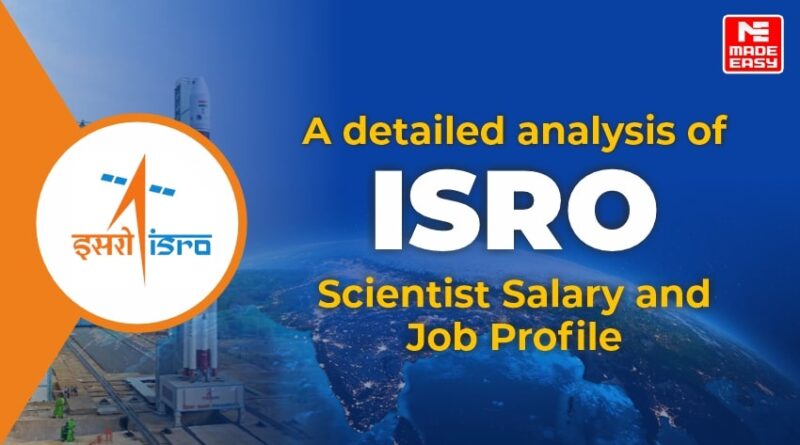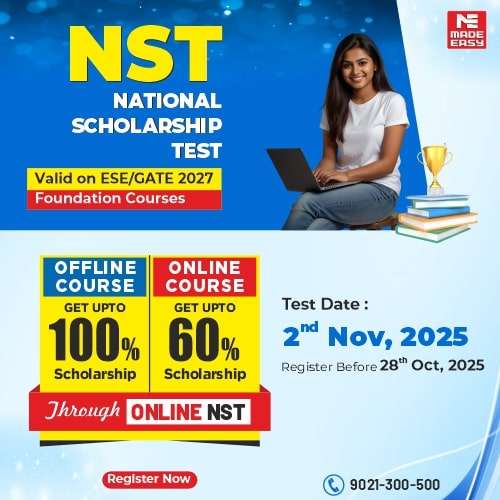A detailed analysis of ISRO Scientist Salary and Job Profile
The Indian Space Research Organisation, popularly known as ISRO, is one of the best government organizations in India that functions under the Department of Space, Government of India.
This renowned organization was established on 15th August 1969 under the guidance of the famous physicist and astronomer Dr. Vikram Sarabhai, and therefore he is also known as the “Father of the Indian Space Program.”
Earlier, ISRO was known as the Indian National Committee for Space Research (INCOSPAR), which was set up in 1962 by the Government of India as envisioned by Dr. Vikram Sarabhai. In 1972, the Department of Space (DOS) was set up by the Government of India, and ISRO was brought under DOS.
The primary objective of ISRO is the development of space technology and ensuring its proper application to various requirements in this particular sector.
The organization plays a critical role in the global space economy as well. The best part is that the organization offers promising opportunities in the form of government jobs for scientist profiles with appreciating ISRO scientist salaries.
This makes the organization an amazing opportunity for professionals who are interested in building a fruitful career in the field of research in the space sector. This blog by MADE EASY will help in exploring salaries of scientists at different levels in ISRO and their job profiles.
ISRO Scientist Job Profile:
ISRO Scientist Job Profile includes the following depending on the respective streams of specialization eligible for the recruitment procedure (of the concerned department) at the Indian Space Research Organisation (ISRO):
- Mechanical: Designing satellite structures and Mechanical components with analysis, the study of kinematics, and the design of spacecraft mechanisms followed by structural dynamics including smart structures and advanced composites; reliability and quality assurance associated with mechanical designs and systems.
- Electrical: Development of test and evaluation systems for spacecraft hardware; installation, commissioning followed by operation, and maintenance of environmental test systems for the spacecraft.
- Electronics: Digital signal processing, design of microprocessor-based onboard systems; high-speed data compression; Designing followed by development and testing.
- Civil: Construction and maintenance of its infrastructure; Remote sensing, GIS, and mapping of urban planning; watershed management, digitization of land records; catchment areas and land use.
- Metallurgy: Research, development, and finalization of materials suitable for the space environment; designing and developing multilayer optical coatings and optical films.
- Optoelectronics: Designing and developing optoelectronic devices and required ones for space applications along with different detection systems and detectors according to the respective projects and launches.
- Instrumentation: Installation, commissioning, operation, and maintenance of environmental test systems associated with the spacecraft hardware; Operation and maintenance of highly specialized data acquisition and control systems.
- Mechatronics: Development of control algorithms and computer simulation; navigation guidance and control for various missions and robotic-related developments.
To be precise, the ISRO Scientist job profile includes the following:
- Designing, and development followed by the system’s implementation involved in the respective department at the Indian Space Research Organization.
- Conducting research and related/required experiments based on the respective department’s needs and priorities in terms of projects.
- Report to the senior professionals and higher authorities regarding the routine activities and project-related activities.
- Guide and manage the junior team members for the proper planning and execution of their respective responsibilities.
What is the salary of an ISRO Scientist?
Salary is an important aspect of any job profile. The ISRO Scientist’s salary per month varies with the post of the respective candidate. The pay scale for different posts associated with the ISRO scientist salary is as follows:
| Post | Pay Band |
|---|---|
| Scientist/Engineer-SC | ₹56100– ₹1,77,500 |
| Scientist/Engineer – SD | ₹67,700 – ₹2,08,700 |
| Scientist/Engineer – SE | ₹78,800 – ₹2,09,200 |
| Scientist/Engineer – SF | ₹1,23,100 – ₹2,15,900 |
| Scientist/Engineer – SG | ₹1,31,100 – ₹216,600 |
| Scientist/Engineer –G and H | ₹1,44,200 – ₹2,18,200 |
| Outstanding Scientist | ₹1,82,200 – ₹2,24,100 |
| Distinguished Scientist | ₹2,05,400 – ₹2,24,400 |
It is important to note that ISRO Scientist Salary after 7th Pay has increased with the respective grade pay. The grade pay for different posts varies depending on the respective scientist’s post and present rank at the organization. Accordingly, the salary of an ISRO Scientist has increased with the specified grade pay numbers.
Apart from the basic salary and grade pay, the ISRO scientist salary per month also receives Dearness Allowance (DA), which is revised twice every year, travelling allowance, DA on travelling allowance. In addition, the ISRO scientists receive the grade pay and allowance based on the current position of the respective candidate.
Do you want to learn about other government job opportunities available for engineers? Then, check out the blog: A detailed analysis of Government Jobs and Vacancies for Engineers to find out more about this.
Now that we know about the critical parts of the ISRO scientist, let us learn some interesting facts about ISRO:
1. What is the full form of ISRO?
Ans. ISRO full form is Indian Space Research Organisation.
2. What is the centre where satellites are made?
Ans. The concerned department manufacture satellites at the ISRO Satellite Centre (ISAC), Bangalore.
3. Where did the Space Programme first start in India?
Ans. The Space Programme (in India) began at the Thumba Equatorial Rocket Launching Station (TERLS). This station is located at Thumba near Thiruvananthapuram.
4. What is the basic qualification requirement of an ISRO scientist?
Ans. The candidate applying must be B.E./B.Tech or equivalent qualification (first class) with a minimum aggregate of 65%. (Average of all results available).
5. What is the maximum/upper age limit of ISRO?
Ans. The upper age limit to apply for the ISRO scientist job profile at the Indian Space Research Organisation (ISRO) is 35, 38, and 40 years for the General, OBC, and SC/ST, respectively.
6. Which educational branches are most preferred at ISRO?
Ans. The recruitment team at ISRO prefers to recruit candidates with master’s degrees in the engineering streams such as computer science, electrical, and mechanical engineering.
In addition, the respective department also prioritizes candidates who have a background in Ph.D. in Astronomy, Mathematics, or Physics for the role of ISRO scientists.
The best way to secure the position of ISRO Scientist is to opt for academic programs such as Aerospace Engineering at the Indian Institute of Science, Bangalore.
7. Is the ISRO Scientist job transferable?
Ans. Yes. The job of ISRO Scientist is a transferable one. This offers the deserving candidates reap benefits from the opportunities offered by this prominent organization.
8. Who is known as the father of Indian Space Program?
Ans. Dr. Vikram Sarabhai is known as the father of Indian Space Program.
9. What is the basic pay of Scientist/Engineer-SC in ISRO?
Ans. The pay scale of Scientist/Engineer-SC in ISRO is 56,100-1,77,500.
So, are you now geared up to become a successful scientist with the ISRO? Then, do not forget to check out the following MADE EASY books to prepare for the successful selection at the Indian Space Research Organisation (ISRO).
- ISRO 2025 Offline Test Series
- ISRO, DRDO 2025: Mechanical Engineering Solved Papers
- ISRO : Previous Years Solved Papers of Computer Science
- ISRO DRDO 2025: Electronics Engineering: Previous Solved Papers
Enroll Now 👉Live-Online JE & AE: 1 Year Foundation Course 2025 – 2026
Hope you found this blog post useful.
Feel free to ask us any questions in the comments below.
All the best for your preparation to become an ISRO Scientist!
Dear Aspirants,
Your preparation for GATE, ESE, PSUs, and AE/JE is now smarter than ever — thanks to the MADE EASY YouTube channel.
This is not just a channel, but a complete strategy for success, where you get toppers strategies, PYQ–GTQ discussions, current affairs updates, and important job-related information, all delivered by the country’s best teachers and industry experts.
If you also want to stay one step ahead in the race to success, subscribe to MADE EASY on YouTube and stay connected with us on social media.
MADE EASY — where preparation happens with confidence.





